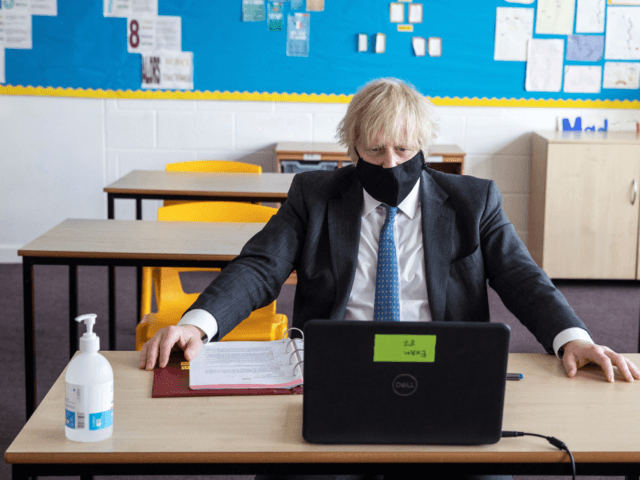There are growing calls within the Tory party for Prime Minister Boris Johnson’s government to introduce draconian restrictions on the internet, including an end to online anonymity on social media, in the wake of the killing of Sir David Amess MP.
On Sunday, Home Secretary Priti Patel suggested that the government may seek to include a ban on anonymity on social media following the suspected Islamist attack.
The call has been picked up by many in the so-called Conservative Party, despite there yet being no reported indication that online abuse led to what is being investigated as potential Islamist terrorism.
Tory MP for Rayleigh and Wickford, Mark Francois, who was a close friend of the slain politician, has been leading the push to introduce a “David’s Law” which would end online anonymity.
Francois said that the forthcoming Online Harms Bill should be amended to prevent trolls from insulting or threatening public figures anonymously, saying: “In the last few years David had become increasingly concerned about what he called the toxic environment in which MPs, particularly female MPs, were having to operate in.”
“He was appalled by what he called the vile misogynistic abuse which female MPs had to endure online and he told me very recently that he wanted something done about it,” the Tory added.
There has been some pushback against the idea, with some claiming that the tragedy of Sir David’s death has been hijacked in order to usher in anonymity restrictions, which presently appear unrelated to the killing.
Responding to the focus being placed on social media abuse and the supposedly contentious political climate, Brexit leader Nigel Farage said: “Everyone is missing the point. Sir David’s murder is not about rhetoric in politics but terrorism. If we misdiagnose the illness then we won’t find a cure.”
‘This Is a Fundamentalist Islamist Terror Attack,’ Says Farage https://t.co/n6ZoSYOEHN
— Breitbart London (@BreitbartLondon) October 18, 2021
In comments made to Breitbart London, Dr Alan Mendoza, the executive director of the Henry Jackson Society, said that Sir David Amess wasn’t killed because people are “rude on Twitter”.
Dr Mendoza said that the focus of the apparent terror attack should be on rooting out Islamic extremism and the “extremist teaching” out of communities in Britain.
The Henry Jackson Society director suggested that the government should take a “full-scale” approach in tackling the problems of “segregation and social division” embedded in some communities, as well as devoting more resources to anti-terror programmes such as Prevent, which reportedly had been allerted to Ali Harbi Ali, the alleged killer of Sir David, apparently without taking action.
Mendoza said that the government should also look to adopt the recommendations of the 2016 Casey Review, which called for “British values” to be instilled in immigrant communities in order to increase social cohesion. The review also said that a heavy emphasis should be placed on learning the English language and for immigrants to agree to an “integration oath”.
The report said that the failures to integrate migrant populations into the UK have come as a result of “regressive, divisive and harmful cultural and religious practices” being overlooked by government institutions out of “fear of being branded racist or Islamophobic.”
“This has not helped the communities which many well-intentioned people in those institutions have wanted to protect; more often it has played straight into the hands of extremists. As a nation, we have lost sight of our expectations on integration and lacked confidence in promoting it or challenging behaviours that undermine it,” the review stated.
Parliament discussing ending online anonymity in response to a terrorist attack. pic.twitter.com/jxpVDo65gr
— Chris Rose (@ArchRose90) October 19, 2021
On top of concerns about the government and the mainstream media focussing on the wrong target, civil rights campaigners have warned that an end to online anonymity could have dire consequences for speech and privacy rights in Britain.
Appearing on the Jeremy Vine programme on Tuesday, Big Brother Watch director Silkie Carlo said that when democracy comes under attack, people should stand up to defend its principles rather than rushing to enact restrictions.
“Anonymity has always enabled people to have debates about controversial issues, to bring corruption to light, and to speak about things better without necessarily wanting to be identified, like for example with workplace harassment,” Carlo argued.
The privacy campaigner went on to note that some of the largest online movements, such as Me Too, would have been stifled if people were not able to speak out anonymously against powerful sexual predators.
Carlo said that any criminal behaviour online should be handled by the police, and not by foreign big tech companies such as Facebook and Twitter.
In Communist China, citizens are required to provide government identification in order to post on social media, a move that widely regarded as intended to shut down political dissent.
Priti Patel May End Online Anonymity in Wake of Politician Killing https://t.co/gd4a0zCxNG
— Breitbart London (@BreitbartLondon) October 18, 2021
Follow Kurt Zindulka on Twitter here @KurtZindulka

COMMENTS
Please let us know if you're having issues with commenting.